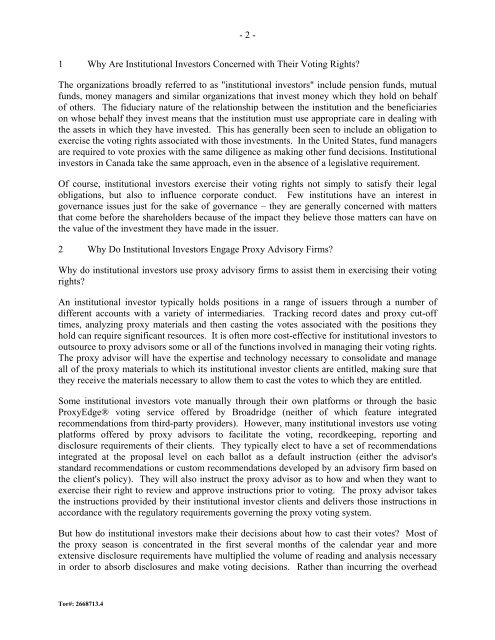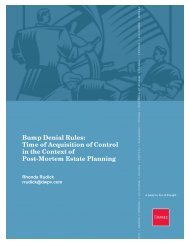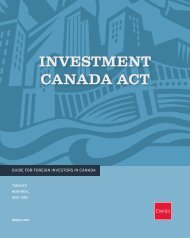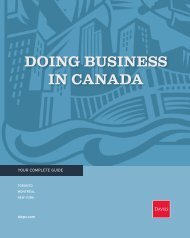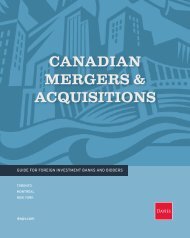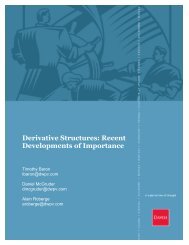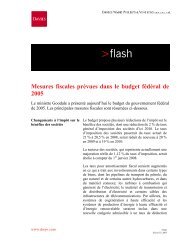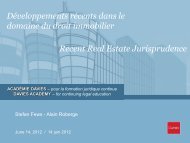The Role Of The Proxy Advisory Firm What Directors Need ... - Davies
The Role Of The Proxy Advisory Firm What Directors Need ... - Davies
The Role Of The Proxy Advisory Firm What Directors Need ... - Davies
Create successful ePaper yourself
Turn your PDF publications into a flip-book with our unique Google optimized e-Paper software.
- 2 -<br />
1 Why Are Institutional Investors Concerned with <strong>The</strong>ir Voting Rights?<br />
<strong>The</strong> organizations broadly referred to as "institutional investors" include pension funds, mutual<br />
funds, money managers and similar organizations that invest money which they hold on behalf<br />
of others. <strong>The</strong> fiduciary nature of the relationship between the institution and the beneficiaries<br />
on whose behalf they invest means that the institution must use appropriate care in dealing with<br />
the assets in which they have invested. This has generally been seen to include an obligation to<br />
exercise the voting rights associated with those investments. In the United States, fund managers<br />
are required to vote proxies with the same diligence as making other fund decisions. Institutional<br />
investors in Canada take the same approach, even in the absence of a legislative requirement.<br />
<strong>Of</strong> course, institutional investors exercise their voting rights not simply to satisfy their legal<br />
obligations, but also to influence corporate conduct. Few institutions have an interest in<br />
governance issues just for the sake of governance – they are generally concerned with matters<br />
that come before the shareholders because of the impact they believe those matters can have on<br />
the value of the investment they have made in the issuer.<br />
2 Why Do Institutional Investors Engage <strong>Proxy</strong> <strong>Advisory</strong> <strong>Firm</strong>s?<br />
Why do institutional investors use proxy advisory firms to assist them in exercising their voting<br />
rights?<br />
An institutional investor typically holds positions in a range of issuers through a number of<br />
different accounts with a variety of intermediaries. Tracking record dates and proxy cut-off<br />
times, analyzing proxy materials and then casting the votes associated with the positions they<br />
hold can require significant resources. It is often more cost-effective for institutional investors to<br />
outsource to proxy advisors some or all of the functions involved in managing their voting rights.<br />
<strong>The</strong> proxy advisor will have the expertise and technology necessary to consolidate and manage<br />
all of the proxy materials to which its institutional investor clients are entitled, making sure that<br />
they receive the materials necessary to allow them to cast the votes to which they are entitled.<br />
Some institutional investors vote manually through their own platforms or through the basic<br />
<strong>Proxy</strong>Edge® voting service offered by Broadridge (neither of which feature integrated<br />
recommendations from third-party providers). However, many institutional investors use voting<br />
platforms offered by proxy advisors to facilitate the voting, recordkeeping, reporting and<br />
disclosure requirements of their clients. <strong>The</strong>y typically elect to have a set of recommendations<br />
integrated at the proposal level on each ballot as a default instruction (either the advisor's<br />
standard recommendations or custom recommendations developed by an advisory firm based on<br />
the client's policy). <strong>The</strong>y will also instruct the proxy advisor as to how and when they want to<br />
exercise their right to review and approve instructions prior to voting. <strong>The</strong> proxy advisor takes<br />
the instructions provided by their institutional investor clients and delivers those instructions in<br />
accordance with the regulatory requirements governing the proxy voting system.<br />
But how do institutional investors make their decisions about how to cast their votes? Most of<br />
the proxy season is concentrated in the first several months of the calendar year and more<br />
extensive disclosure requirements have multiplied the volume of reading and analysis necessary<br />
in order to absorb disclosures and make voting decisions. Rather than incurring the overhead<br />
Tor#: 2668713.4


